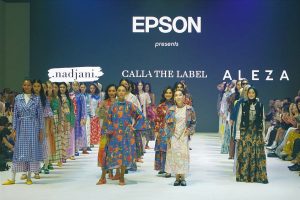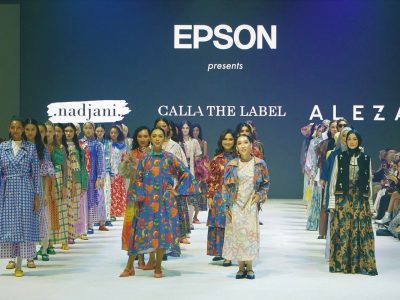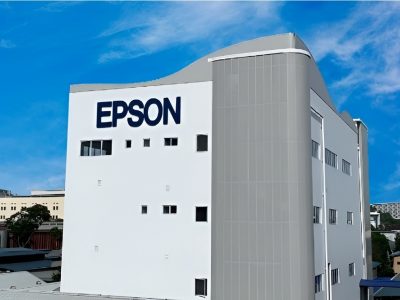Epson’s Textile Printers are revolutionizing the World of Fashion

To be fashionable is to change one’s mind – typically four times a year, as the world’s fashion houses unveil their new seasons’ portfolios. This has been going on for decades but today’s consumer is now looking beyond the catwalk and according to a McKinsey/Business of Fashion report, one of the top ten demands facing the fashion industry today is how to be sustainable.
Energy-consuming, polluting and wasteful, very few fashion brands and manufacturers have taken their environmental responsibilities seriously and consumers are demanding meaningful action that reflects their personal values.
This sets the stage for digital textile printing. First introduced in the 1990s with the advent of ink-jet print capabilities, digital textile printing offers a number of immediate and strategic advantages. Most obviously, traditional screen printing – whether for fabric or other materials – is costly if multiple designs are to be printed, since a separate stencil is needed for each colour. The process is also obviously time-consuming. The next huge advantage is that digital printing has no minimum size production run and customers can print bespoke designs in single metre lengths if desired, and with more colour and design accuracy. Digital printing also requires less water consumption with decreased use of dyes and solutions, hence this process is more environmentally friendly and again delivers cost savings while meeting the demands of the consumer. Epson products, including inkjet printers, comply with environmental label standards set by major markets around the world.
An important benefit of digital direct to fabric printing is it gives the printer the ability to produce multiple colours or designs within a single roll of fabric. This means fast turnaround and the ability to rapidly handle reprints and reorders, as well as printing large runs. The process also allows printing onto materials up to 1,800mm width. DTF printing is ideal for multiple different fabric types – including cotton, viscose, polyester, nylon, silk, using different ink depending on the fabric.
The versatility of DTF printing extends beyond long runs and wide lengths of fabric.
For fashion brands and their designers, small runs of digitally printed fabrics allow them to “experiment” with the colour combinations and designs of their wildest dreams and test out new products before going into mass production. This is the ideal solution for the luxury fashion brand market, and again supports better sustainability as less surplus or “failed” product ends up back in the supply chain.
Beyond apparel, digital printed textiles are all around us. As well as backdrops and banners for exhibitions and trade shows, the interior décor market is huge, covering everything from drapes, curtains and bedding to wallpaper and furnishings. Little surprise the global digital textile printing market was valued at $2.2 billion in 2019, and is projected to reach $8.8 billion by 2027, growing at a CAGR of 19.1% from 2020 to 2027.
Limited only by the imagination
In the traditional industry model, in which designs are printed on fabric using a transfer process, designers are heavily constrained in their use of colours. In contrast, there is no limit to the number of colours designers can work with when using digital textile printing, allowing them free rein to use source images such as photographs and artworks.
Removing the barriers to production
Advances in quality have been key to today’s widespread adoption of digital textile printing technology by the fashion industry. Improvements in printers give us longer-lasting and sharper prints, and new inks, like Epson’s Genesta range, ensure that production can cover a wide range of textile fibres. Importantly in today’s economic situation digital textile printing is often more cost effective. Definitely it facilitates faster turn-round, whether to enable customers to get their hands on exclusive products without having to wait for the mass production, or to fulfil one-off commissions – be it from a bride or a celebrity.
For the manufacturer, digital textile printing brings greater business opportunity and agility, in enabling production across segments to meet the market demands – from luxury and fast fashion apparel and home décor, to providing a sample print preview to a brand before going to mass production. A manufacturer can now produce everyday wearables for the fast fashion brands such as Zara and H&M where turnaround time from concept to store is less than two weeks. At the other end of the scale, the ultra-high end luxury apparel brands are competing to deliver the customised experience that can only be supported through small production runs and again, fast turnaround for everything from interior soft furnishings such as curtains, sofa covers and bedding, to accessories like tote bags and shoes.
Digital fabric printing removes the barriers of large and slow production runs and today, designers and the brands they support are only limited by the designers’ imagination.
New markets for savvy operators
While all the advantages are obvious, digital textile print companies are reaping huge benefits from the inherent advantages they offer to customers which were previously unsupportable due to minimum production run capabilities. These include:
– online operators offering everything from face masks and apparel through to high-end soft furnishings
– fashion and design schools where students traditionally grappled with how to deliver their vision using commercially available textiles
– early stage startups where initial production runs do not qualify for “mass production” status
– highly specific / customised products catering to special needs markets where cost may not be an issue due to the highly specialized purpose
Epson is committed to strengthening its presence in textile printing and aims to provide products and services that surprise and delight customers in this rapidly expanding market. All Epson inks and equipment conform to the highest environmental guidelines enabling designers to create with confidence their own textile patterns in the exact design they want, when they need it, and in just the quantity required. The new range of Epson industrial textile printers offers maximum versatility for customised products on-demand – from stunning fashion items to creative interior décor.
From the producer’s point of view, affordability is crucial; the Epson digital textile printer’s low cost of ownership, ease of operation and optimized performance put advanced production technology within the reach of visionary designers, helping them bring their designs to commercial reality in a constantly changing fashion world.
Posts You May Like
Get Social With Us



